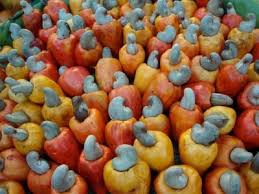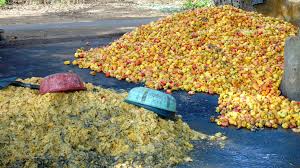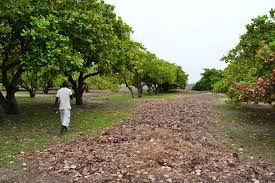![]()
If you’ve landed on this article page, you’re probably searching for a
good business idea—an idea that’s light on the pocket but heavy on
returns, promising both a fulfilling journey and potential profit.
|
How to start a lucrative Cashew farm in Nigeria
Cashew farming is the cultivation and growing of cashew crop.
Cashew is one of the most popular tree crops in Nigeria. Cashew
farming is also known for its profitability. Cashew farming is
done in 27 states in Nigeria. 60 – 70% of cashew farmers in
Nigeria are small holder farmers. About 30% of cashew farmers in
Nigeria hold medium to large scale cashew farms.
Kaduna, Kogi, Nasarawa, Benue, kwara, Lagos, Ondo, Osun, Oyo,
Ekiti, Edo, Delta, Rivers, Cross Rivers, Akwa Ibom, Imo, Abia,
Anambra, Ebonyi and Abia are some of the largest cashew
producing states in Nigeria.
Cashew is mainly grown for its nuts. Juice can also be extracted
from cashew fruits. To extract juice from cashew fruits, the
cashew fruits must be plucked and squeezed. Cashew fruits can
also be consumed by people. Cashew nuts are usually exported out
of Nigeria where they are roasted and packed as snacks.
A large percentage of cashew produced in Nigeria are exported to
Vietnam, India and other countries. Nigeria exported 184,000
tons of cashew nuts in the year 2020, according to Statista.
Nigeria remains one of the largest exporters of unprocessed
cashew nuts in the world.
Farmland to use for Cashew Plantation
You need to have a freehold ownership of a farmland for you to
grow cashew. It is not advisable to use a farmland on a short
lease. Cashew is a perennial crop so you need to have full
ownership of the farmland. The farmland should also have a
fertile soil. There should be good road connectivity to the
farmland for easy evacuation of your produce.
Climatic Conditions Suitable for Cashew Farming: Cashew grows in
tropical conditions. Cashew will not grow in cold and temperate
areas or regions. Cashew general is cultivated in areas that are
at least 650 metres above sea level. Cashew can grow well in
areas with temperature of 20 Celsius to 39 Celsius, though 30
Celsius is the optimum temperature for the growing of cashew.
Cashew can tolerate areas with annual rainfall of 1000 – 2000
mm. Cashew also needs about 4 months of dryness (no rains) for
it to have an optimum yield. This explains why cashew does well
in Savannah areas than rain forest areas. High rainfall and
humidity can negatively impact the growth of cashew.
Soil Preparation: For large cashew plantation, bulldozers can be
used to remove trees, stumps and weeds. Care should be exercised
so that the top soil will not be removed. Trees, stumps and
weeds can also be removed by hand with the use of cutlasses,
axes and hoes.
Ploughing should be done after the removal of the trees, stumps
and weeds. After ploughing, harrowing should be done. Several
rounds of ploughing and harrowing may be done depending on the
condition of the soil. Ridging should be done for areas prone to
flooding.
Soil that has poor fertility and low organic matter should be
amended with manure and compost. Humus can also be added to the
soil.
Phosphatic fertilizers like Single Super Phosphate fertilizer or
Diammonium Phosphate Fertilizer should be applied to every pit
meant for planting of the cashew seedlings. Depending on how
fertile the soil is, up to 250 grams of Single Super Phosphate
fertilizer may be applied per planting hole.
About 100 cashew seedlings can be planted on one hectare of
farmland, if the planting pattern of 8 metres by 5 metres is
used. If planting space of 7.5 metres by 7.5 metres is used, 175
cashew trees can be planted on one hectare. For high density
cashew planting, up to 500 cashew trees can be planted on one
hectare.
Below are some of the varieties of cashew that can be planted in
Nigeria, they are:
Nigerian Cashew Variety: This is an open pollinated cashew
variety. It can yield 0.5 tons of cashew nuts per hectare. It is
the oldest type of cashew variety planted in Nigeria. It is not
pests and diseases resistant like the hybrid cashew varieties.
This variety starts fruiting after 4 – 5 years.
Brazilian Jumbo Cashew Variety: The Brazilian Jumbo cashew
variety is a hybrid cashew variety. This cashew variety can
yield up to 2 tons per hectare. This variety starts fruiting
after 2.5 years.
Indian Dwarf Cashew Variety: The Indian cashew variety is an
improved cashew variety. This cashew has a yield potential of
1.5 tons per hectare. This variety starts fruiting after 2.5
years.
Equipment:
The following equipment can be used for cashew farming:
Tractors, Boom Sprayer, Harrowers, Plough, Farm House, Power
Tiller, Cutlasses, Hoes, Earth Augers, Motorised Sprayers,
Weeders etc.
Transplanting of Cashew Seedlings: 100- 200 grams of Single
Super Phosphate fertilizer should be applied to each planting
hole before transplanting the cashew seedlings. Transplantation
of cashew seedlings should be done when the intensity of the sun
is low. Mychorizhae and other microbial innoculants should be
added to every planting hole. This will increase the number of
beneficial microbes in the soil. Nematicides may also be used if
the soil is infected with harmful nematodes.
Weed Control: Herbicides can be used to kill weeds on cashew
farms. Weeders and other mechanical tools can also be used for
weed management in cashew farming. Plastic mulches and other
types of mulches can be used for the prevention of the growth of
weeds. Tools like cutlasses and hoes can also be used for weed
management.
Training and Pruning of Cashew: In the first year of the cashew
tree, the sprouts emanating from the root stock should be
removed so that the cashew tree can concentrate its nutrients on
the growth of the tree.
Pruning should be done frequently so that nutrients can be
directed to the flowers and fruits. Excessive pruning can damage
the cashew tree. The lower branches should be removed in the
first three years so that the tree can grow to form a shade.
After the 4th year, pruning may not be needed again.
How Much Does it Cost to Start a One Hectare Cashew Farm in
Nigeria
The cost to start a one hectare cashew farm is shown as follows:
Acquisition of one hectare farmland: N90,000 – N350,000
Surveying and Land Documentation: N90,000 – N190,000
Clearing, Ploughing and Harrowing: N45,000
Seedlings: N41,000
Planting: N11,000
Irrigation: N290,000 – N640,000 (Optional)
Fertilizers and Manure: N20,000 – N100,000 (Depending on soil
fertility)
Pesticides: N22,000
Others: N90,000
Advantages of Cashew Plantation
The following are the advantages of having a cashew farm:
It can provide income for a lifetime.
Cashew farming can be a source of employment for people.
Cashew trees are friendly to the environment.
Cashew produce can be used as food for human and animal.
Biodiesel and other industrial byproducts can be gotten from
cashew.
The harvest season for cashew nuts in Nigeria usually occurs
between the months of February and May, and sometimes it can
extend into June, depending on the region and specific planting
dates.
In Africa, the planting and harvest season for cashew nut
farming varies depending on the country and region. For
instance, in Ivory Coast, the planting season is between March
and June, and the harvest season is between December and March.
In Tanzania, the planting season is between October and January,
while the harvest season is between September and November. In
general, the best time to plant cashew nuts in Africa is during
the rainy season to ensure adequate moisture for growth.
Get our Practical Guide on How to set up a lucrative Cashew nut
farming. We will show you a step by step guide on how to succeed
in cashew farming business. The business is not a quick rich
kind of business it takes 3 years to make a hit but worth the
wait. It involves a lot of capital both in planting and
harvesting. A ton of cashew nut is between N800k to 1M naira
now. You can tap into this great opportunity and start making
money
|







